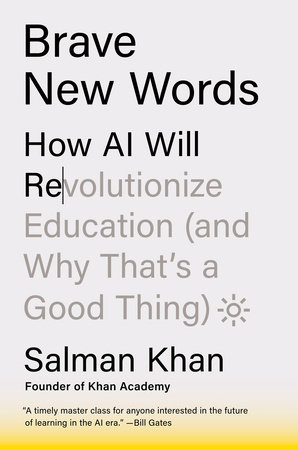Brave New Words

I am a fan of Salman Khan’s work and indebted to Khan academy. His videos on YouTube made some math concepts more accessible for me during my high school and played a part in my learning and excitement in STEM. And I totally believe in Khan academy’s philosophy that everyone deserves high-quality education. That said, Salman Khan’s Brave new words is about how AI will revolutionalize education, though it feels like an advert for their new AI “product” Khanmigo which is built on ChatGPT.
I am still on the fence about the core hypothesis here that AI is good for education, I believe it is possible one day, but we are still going through the growing pains as of now. Before going to the critcism, there are a few important concepts that I learned in this book and look forward to implement in my own learning and teaching. One of them is Socratic dialogue, where the role of the teacher is to ask the right questions to nudges the student in the right direction instead of giving the answer. This build the confidence and independence in students. I do this sometimes in my interactions, but giving this technique a name makes it a more conscious process.
[..] there are important benefits to having students write essays independently, such as developing their ability to plan and not procrastinate, both of which are skills arguable as useful as learning to write.
This quote from the book, while feel like a personal attack, also points towards certain skills we all need to acquire if we want to cohabit with technology.
[..] what if the next million [..] have access to an army of tutors that can ensure that they stay motivated and engaged?
We know that if a well-trained tutor pulls kids out of class for thirty minutes a day, four days a week – a technque that Loeb refers to as high-dosage tutoring – there’s really good evidence it produces a significant motivating effect for students no matter where they are.
I believe I am a living example of that this technique produces a significant motivating effect. My academic motication grew exponentially when a particular teacher of my started giving special attention to me in my high school. And I believe a well-designed AI tool can have the ability to motivate people into doing anything, it will know everything possible to know about you afterall. But this is a double edged sword given that attention economy is leading the charts of profitable companies. The argument over how this fits into digtial minimalism away from corporate greed might be a discussion for another book, another time.
One criticism I have is that most of the strategies proposed to stop student from involving in unethical behaviour here assumes that students cannot access any other AI tools other than Khanmigo, but I don’t blame Sal Khan here, we are yet to find any realistic solutions for these problems we are facing as we adopt to the new reality. I really enjoyed the last chapter where Sal Khan gives a quick history of how Khan Academy came into being, taking advantage of the free platform of YouTube, which is very easy to locally archive. In a scenario where Khan Academy decides to become for-profit or anything, all of the lectures can be backed-up and distributed easily, which is not the case with Khanmigo which seems to rely on OpenAI’s mercy, so I believe they should pivot to using an open-source alternative and make the finetuning avaialable so that it is eassy to reproduce locally across the world.
While this book promotes the fact that having a way to communicate with very knowlegeble bot can be an enriching experience, there are ideas that solitude is need to creativity (Viginia Woolf’s A room for oneself) and Byung-Chul Han’ Crisis of Narrative about how information overload of modern world means we pay lower attention to each other narrating and less time contemplating, making us unhappy, isolated and feeling meaningless. These are the books I want to pick up next.